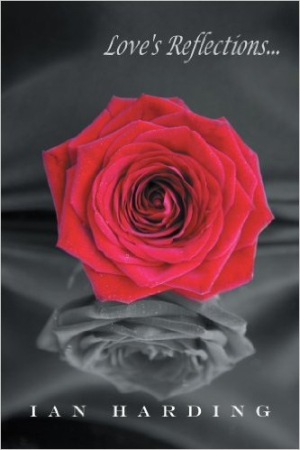It looks like you've stumbled upon a page meant to be read by our code instead of viewed directly. You're probably looking for this page.
Love's Reflections
With its rare dual focus on the throes of romance and the acrimony of a breakup, this collection is a reminder that all relationships have a shadow side.
In his poetry collection Love’s Reflections, Ian Harding contrasts the emotional highs of romance with the depths of heartbreak. The book is nicely varied in terms of form and technique.
The collection is split into two portions, with the first given to celebrating the excitement and heat of romantic desire, often by way of nature images and scenes from travels in Italy. The second part represents a marked shift of mood from languid sentimentality to bitterness as the poet narrates the aftermath of love breaking down.
Stanza lengths vary, but repeated sounds, along with a preoccupation with the sky, are linking elements. Old-fashioned word choices and melodramatic sections contrast with some of the more original vocabulary.
The poems range in form from blank verse to regimented rhyme schemes. More often, the author chooses the sound techniques of alliteration and repetition for rhetorical effect over conventional rhyming. The sibilance in “Pecher” is notable, with its “sequined seas” and “sacrifice scales for petals.” Likewise, “dusk settles daylight’s accounts” in the poem “Your Name” is particularly inventive and sonically pleasing. Several poems repeat phrases or entire lines, which sometimes creates entrancing rhythms but elsewhere starts to overpower shorter poems.
Language of hearts, kisses, anticipation, and release saturates the first portion of the book. Archaic diction, like “O” and “thee,” contributes to an antiquated notion of courtly love. Odd imagery makes some of the verse less coherent, as in “Caressing a soul’s crunching desire / To encircle and forge together.” Allusive lines can be more evocative, as with “I drift as a cloud,” which recalls William Wordsworth, and “love’s scorched ring,” which brings to mind a well-known Johnny Cash lyric.
The metaphorical palette improves in the second half of the book, with lines like “the blanket of love snagged / Across the root of wisdom’s tree” and a reference to “a Gothic mascara sky” standing out as especially powerful. This section also picks up on the frequent astral imagery from the first part, here focusing largely on clouds. The overall impression is of gray clouds and exaggerated lovesickness, forming a useful counterbalance to the idealistic vision of the previous section.
The overall two-part structure works quite well, but within each section the order of the poems feels arbitrary. In particular, the final poem, the psalm-like “Judgement,” has a vengeful bent that makes for a sudden and almost brutal ending.
With its rare dual focus on the throes of romance and the acrimony of a breakup, this collection is a reminder that all relationships have a shadow side.
Reviewed by
Rebecca Foster
Disclosure: This article is not an endorsement, but a review. The publisher of this book provided free copies of the book and paid a small fee to have their book reviewed by a professional reviewer. Foreword Reviews and Clarion Reviews make no guarantee that the publisher will receive a positive review. Foreword Magazine, Inc. is disclosing this in accordance with the Federal Trade Commission’s 16 CFR, Part 255.
